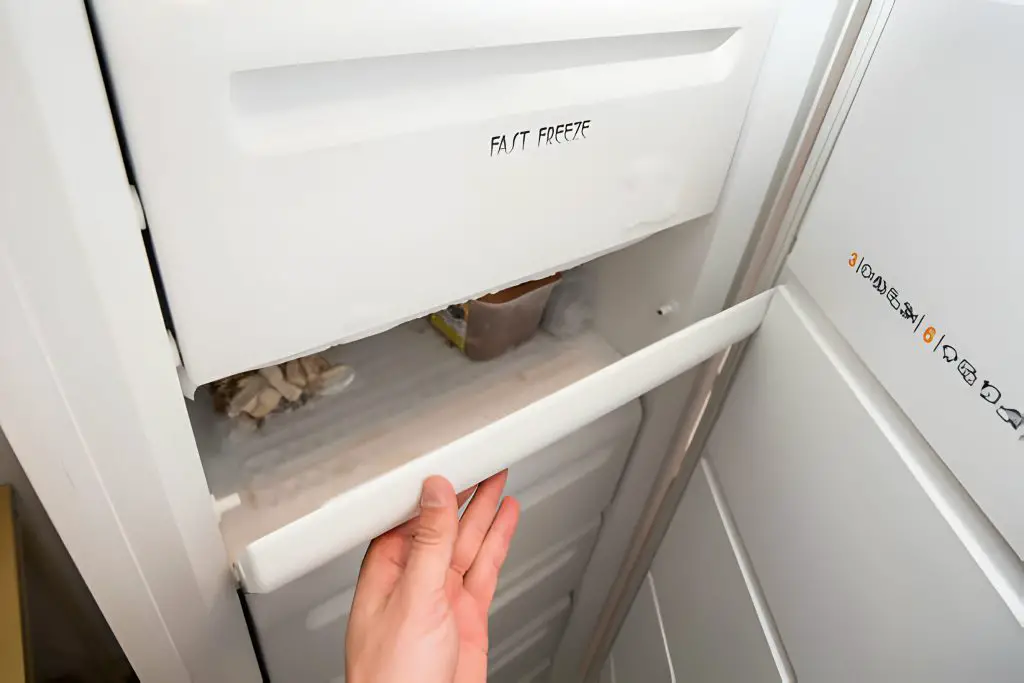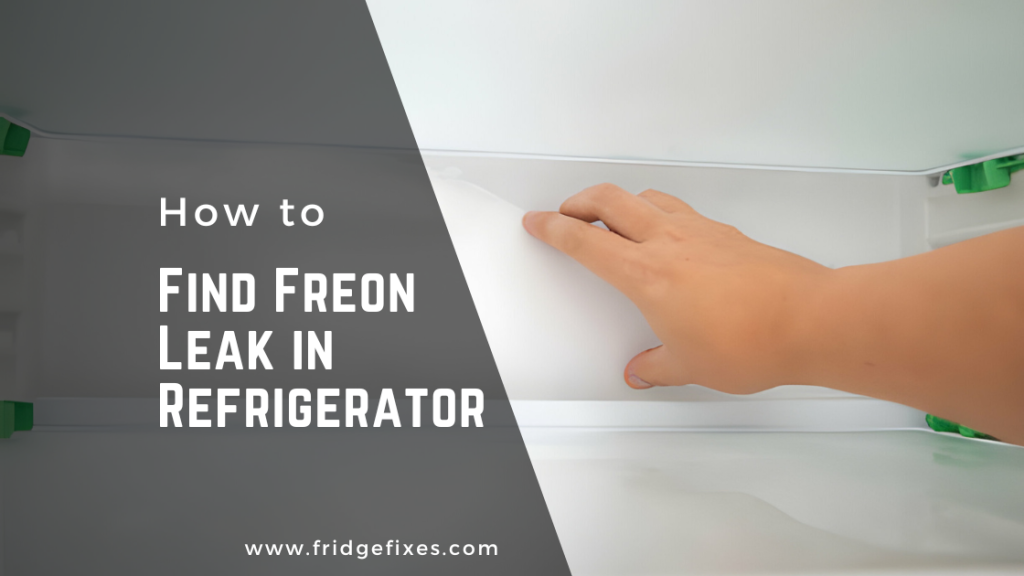To find a Freon leak in a refrigerator, visually inspect for oily residues or use a Freon leak detector. Listen for hissing sounds which can indicate escaping gas.
A Freon leak in a refrigerator is a common issue that can impair cooling efficiency and environmental safety. Identifying and repairing a Freon leak is crucial to maintain the appliance’s performance and to comply with environmental regulations. Refrigerator leaks may not always be obvious, making detection a task that often requires attention to subtle signs.
Homeowners and technicians alike can implement specific techniques to pinpoint the source of the leak. These methods range from basic visual inspections to using specialized detection equipment designed to sense refrigerant gases. It’s essential to address leaks promptly as Freon, a trade name for a class of refrigerants, can deplete the ozone layer and contribute to climate change if released into the atmosphere. Knowledge of these detection strategies is beneficial for anyone looking to ensure their refrigerator runs efficiently and eco-consciously.
Spotting The Warning Signs Of A Freon Leak
Refrigerators silently hum away, keeping food fresh and cool. But what happens when they leak Freon? The warning signs might not be loudly announced, but they’re noticeable if you know what to look for. Paying close attention to these signs can save food, money, and the environment. Keep an eye out for the classic clues your refrigerator is telling you it has a Freon leak.
Unusual Noises And Odors
Refrigerators should run quite smoothly. Loud noises coming from your fridge may signal trouble. If you hear hissing, bubbling, or gurgling sounds, take note. These could indicate escaping Freon.
Foul smells should never come from your fridge. A Freon leak can release a pungent odor. It may smell like sweet ether or chloroform. If unusual smells accompany strange noises, consider it a red flag.
Spoiling Food Despite Cold Settings
Have you ever noticed food spoiling quickly? This could mean your fridge is not cooling effectively. Here’s a checklist to investigate further:
-
- Check the thermostat: Is it set properly but not chilling the food?
- Monitor the temperature: Place a thermometer inside. Is it showing a higher temperature than set?
- Look for ice build-up: Freezers should defrost. Too much ice might mean a Freon issue.
Consistent problems, even after tweaking settings, hint at Freon trouble. Recognizing these signs early can prevent wasted food and energy.

Safety First: Preparing To Search For A Freon Leak
Dealing with a Freon leak in your refrigerator can be risky. Safety always comes first. Before starting your search for a Freon leak, it’s crucial to prepare. This guide will show you how to do it right and stay safe.
Proper Ventilation And Protective Gear
Freon gas can be harmful if inhaled. Open windows and doors to ensure the area is well-ventilated. Wear safety goggles and gloves. Long sleeves and pants will protect your skin. A mask is a must to avoid breathing in the gas.
Disconnecting Power To The Refrigerator
- Turn off the refrigerator. Reach behind to unplug it from the wall.
- Ensure the plug is completely disconnected.
- Check if the refrigerator power indicator is off.
- Keep the refrigerator doors open to avoid gas build-up.
Visual Inspection: The First Step In Identifying Leaks
Spotting a Freon leak in a refrigerator is vital for its proper function. Visual inspection kicks off the troubleshooting process. Simple clues can reveal leaks before they snowball into bigger issues.
Examining Coils And Tubing
Refrigerator coils and tubing hide leaks well. Explore the entire length for any signs. Here’s what to note:
- Look behind the fridge for the coils.
- Follow the tubes that run from the compressor.
- Check for any abnormal frost build-up or damage.
Looking For Oil Residue As A Leak Indicator
Oil residue often accompanies a leak. It’s a telltale sign that Freon might be escaping.
- Inspect the base of the fridge for oily patches.
- Glance near the compressor for signs of oil.
- Use a cloth to dab and confirm if it’s oily.

Credit: www.amazon.com
The Soapy Water Test: A Simple Leak Detection Method
Discovering a Freon leak in your refrigerator can be challenging without the right tools. A popular, effective method for pinpointing these elusive leaks is the Soapy Water Test. This simple, DIY approach can save time and potentially reduce costs in identifying the leak’s location. Let’s dive into the steps to perform this test.
Creating Your Leak Detection Solution
To start, you’ll need to make a leak detection solution. This process is straightforward and uses household items. Here’s what you’ll need:
- Dish soap
- Warm water
Combine these ingredients in a bowl:
- Fill the bowl with warm water.
- Add a few squirts of dish soap.
- Mix until soap bubbles form.
Your soapy solution is now ready. It’s the secret to unveiling hidden leaks.
Applying The Solution And Observing Bubbles
With your solution prepared, the next step is application:
- Turn off your refrigerator to prevent airflow disturbance.
- Dip a sponge or cloth into the soapy water.
- Gently apply the solution to areas where leaks are suspected.
Focus on these common leak sites:
- Refrigerant lines
- Valves
- Connections and joints
After applying, observe the coated areas. Leak presence will be evident by bubble formation. If you notice bubbling, you have found your leak.
Leaks can cause your refrigerator to lose its cooling power, so finding and fixing them promptly is crucial. Remember, after detecting leaks with the soap test, enlist a professional to perform safe and effective repairs.
Utilizing Electronic And Uv Dye Leak Detectors
Finding a Freon leak in a refrigerator is crucial to keep it working well. Special tools help find these leaks. Two popular ones are electronic and UV dye leak detectors. These tools are great for finding even small leaks. This section explains how to use them and their pros and cons.
Pros And Cons Of Electronic Leak Detectors
Electronic leak detectors are often used to find Freon leaks.
| Pros | Cons |
|---|---|
|
|
How To Use Uv Dye And A Uv Light For Leak Detection
UV dye and UV light is another method to find leaks. Here’s how:
- Add UV dye to the refrigerant system.
- Let the refrigerator run for a few hours.
- Shine a UV light around the fridge.
- Look for bright spots that show leaks.
This method is good because it shows exactly where leaks are. Be sure to wear safety glasses!
After The Leak: Refrigerator Repair Or Replacement?
Discovering a Freon leak in a refrigerator raises the crucial question: repair or replace? The choice hinges on the damage scale and whether the cost of repair justifies extending the appliance’s life or if it’s time for a new start.
Evaluating The Extent Of The Damage
To decide between repair or replacement, assess the damage thoroughly. Freon leaks can range from minor issues to major faults. Consider these factors:
- Amount of leaked Freon: Little leaks might just need simple fixes.
- Age of the refrigerator: Older units may not warrant the cost of repair.
- Energy efficiency: Newer models may save money in the long term.
Put these aspects on a balance to see which way it tips.
When To Call A Professional For Repair
Some refrigerator problems are DIY-friendly, but a Freon leak isn’t one of them. Here’s when expert help is a must:
| Scenario | Best Action |
|---|---|
| Ongoing Issues: Fridge not cooling consistently. | Call a pro for potential Freon issues. |
| Leak Sound Detection: Hissing sounds near coils. | Get a technician to identify and seal leaks. |
| Presence of Ice: Ice build-up on coils. | Professional inspection can conclude the cause. |
Remember, handling Freon requires certification due to its hazardous nature. Always opt for certified technicians for safe and proper repairs.

Credit: www.ft.com
Frequently Asked Questions On How To Find Freon Leak In Refrigerator
Can A Fridge Still Cool With A Freon Leak?
A refrigerator with a Freon leak may still cool, but not effectively. Efficiency decreases as the refrigerant level drops, which could lead to perishables spoiling faster. Eventually, the fridge will fail to maintain the desired temperature.
What Are Common Signs Of A Freon Leak In Fridges?
Common signs include a hissing noise, chemical odor, and the fridge’s motor running non-stop. Additionally, you might notice inadequate cooling and the presence of ice buildup on the piping and coils.
How Do Technicians Detect Freon Leaks In Refrigerators?
Technicians often use electronic leak detectors, UV dyes, or soapy water to detect leaks. These methods reveal even the smallest leaks by detecting escaping gases, showing visible traces, or forming bubbles at leak points.
Is A Freon Leak In A Refrigerator Dangerous?
Refrigerant leaks can be harmful due to the chemicals. Freon, a trade name for CFC or HCFC refrigerants, can cause health issues upon prolonged exposure. However, newer fridges use safer refrigerants like HFCs or natural alternatives.
Conclusion
Identifying a Freon leak in your refrigerator is crucial for efficiency and safety. This guide has walked you through the steps needed for detection. Remember, routinely check for wear and tear to prevent future leaks. Should you encounter any complexities, don’t hesitate to call a professional.
Regular maintenance is the key to a long-lasting, functioning fridge. Stay cool and proactive with your appliance care!

